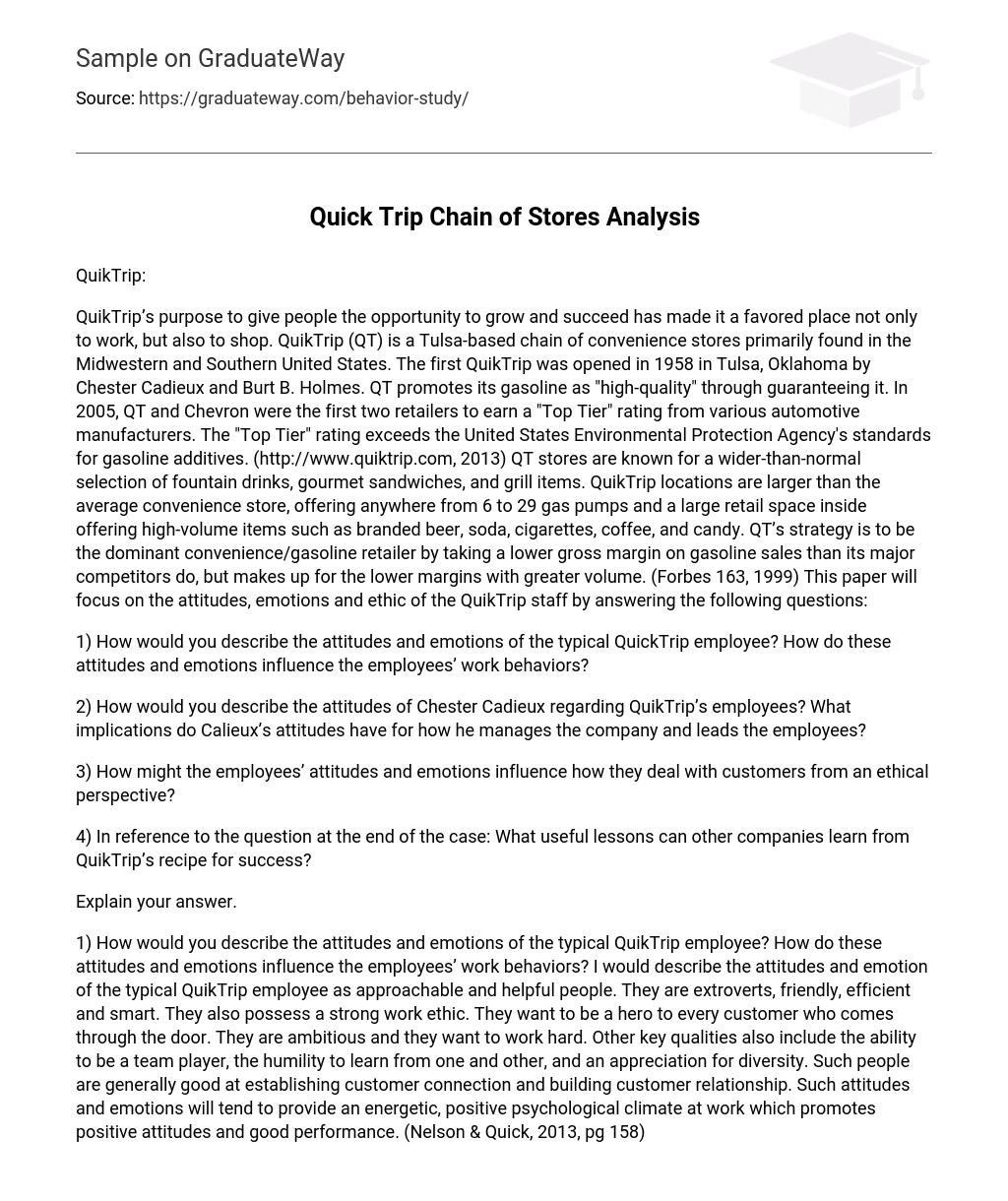QuikTrip:
QuikTrip’s purpose to give people the opportunity to grow and succeed has made it a favored place not only to work, but also to shop. QuikTrip (QT) is a Tulsa-based chain of convenience stores primarily found in the Midwestern and Southern United States. The first QuikTrip was opened in 1958 in Tulsa, Oklahoma by Chester Cadieux and Burt B. Holmes. QT promotes its gasoline as “high-quality” through guaranteeing it. In 2005, QT and Chevron were the first two retailers to earn a “Top Tier” rating from various automotive manufacturers. The “Top Tier” rating exceeds the United States Environmental Protection Agency’s standards for gasoline additives. (http://www.quiktrip.com, 2013) QT stores are known for a wider-than-normal selection of fountain drinks, gourmet sandwiches, and grill items. QuikTrip locations are larger than the average convenience store, offering anywhere from 6 to 29 gas pumps and a large retail space inside offering high-volume items such as branded beer, soda, cigarettes, coffee, and candy. QT’s strategy is to be the dominant convenience/gasoline retailer by taking a lower gross margin on gasoline sales than its major competitors do, but makes up for the lower margins with greater volume. (Forbes 163, 1999) This paper will focus on the attitudes, emotions and ethic of the QuikTrip staff by answering the following questions:
1) How would you describe the attitudes and emotions of the typical QuickTrip employee? How do these attitudes and emotions influence the employees’ work behaviors?
2) How would you describe the attitudes of Chester Cadieux regarding QuikTrip’s employees? What implications do Calieux’s attitudes have for how he manages the company and leads the employees?
3) How might the employees’ attitudes and emotions influence how they deal with customers from an ethical perspective?
4) In reference to the question at the end of the case: What useful lessons can other companies learn from QuikTrip’s recipe for success?
Explain your answer.
1) How would you describe the attitudes and emotions of the typical QuikTrip employee? How do these attitudes and emotions influence the employees’ work behaviors? I would describe the attitudes and emotion of the typical QuikTrip employee as approachable and helpful people. They are extroverts, friendly, efficient and smart. They also possess a strong work ethic. They want to be a hero to every customer who comes through the door. They are ambitious and they want to work hard. Other key qualities also include the ability to be a team player, the humility to learn from one and other, and an appreciation for diversity. Such people are generally good at establishing customer connection and building customer relationship. Such attitudes and emotions will tend to provide an energetic, positive psychological climate at work which promotes positive attitudes and good performance. (Nelson & Quick, 2013, pg 158)
2) How would you describe the attitudes of Chester Cadieux regarding QuikTrip’s employees? What implications do Calieux’s attitudes have for how he manages the company and leads the employees? I would describe Chester as an Extrovert, Sensing, Thinking, and Judging (ESTJ). This type sees the world as it(S), make decisions objectively (T), and like structure, schedules and order (J). ESTJ are conscious of the chain of command and see work as a series of goals to be reached by following rules and regulations. They have little tolerance for disorganization and have a high need for control as Cadieux emphasized on hire better people, train them better implies that he is practical, realistic, and decisive. He mentioned “We are obsessed with keeping stores clean and well merchandized and with providing a rewarding customer experience over all.” suggesting that he has a clear set of logical standards, systematically follows them and wants others to do the same, forceful in implementing plans. (Nelson & Quick, 2013, pg 96)
3) How might the employees’ attitudes and emotions influence how they deal with customers from an ethical perspective?
Ethical behavior is acting in ways consistent with one’s personal values and the commonly held values of organization and society. If the employees’ attitudes and emotions are positive and fair, they would treat each and every customer equal and not looking for personal gain. If the employees’ attitudes and emotions are negative, they would treat the each and every customer differently, which will impact the business. Furthermore, employees’ with poor ethic, may result in negative outcome such as stealing, lying, fraud and deceit, conflict of interest and influence buying, hiding versus divulging information, cheating, personal decadence, interpersonal abuse, organizational abuse and rule violations. One important source of individual differences in ethical behavior is work values. Work values are important because they affect how individuals behave on their job in terms
of what is right or wrong. Four work values relevant to individuals are achievement, concern for others, honesty and fairness. (Nelson & Quick, 2013, pg 142) 4) In reference to the question at the end of the case: What useful lessons can other companies learn from QuikTrip’s recipe for success? Explain your answer.
QuikTrip’s recipe for success can be a management revelation for other business. One of the useful lessons is that QT stresses excellence in customer-employee interactions where QT considers its employees to be a “living brand and the company devotes a great deal of time and energy to training and developing them so that they can reflect core values.”OT realized providing customers with high-quality products and excellent service. The “human touch” concept in QuikTrip would give companies a competitive advantage against others. The employees seem to be glad to work at QT. The job satisfaction in QT is related to many other important personal and organizational outcomes, such organizational citizenship behavior (OCB), which is viewed as voluntary behavior above and beyond the call of duty. (Nelson & Quick, 2013, pg 128)





